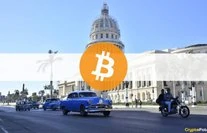Cuban central bank has revealed that licenses for VASPs will be available from May this year.
The Cuban central bank – the Banco Central de Cuba (BCC) – is all set to issue licenses for cryptocurrency and other virtual asset services providers (VASPs).
The Gazette revealed that they will be for one year, with the option to be extended for one more.
As per the resolution published in Official Gazette No. 43, BCC will grant licenses to national and foreign individual human beings and organizations.
With the new system in place, BCC stated that the approved licenses will be valid for one year. However, an extension is possible for a second year citing the “experimental and novel nature” of the space.
No details have been further divulged regarding license expiration after two years.
The central bank of the Caribbean country also said it will examine the legality, opportunity as well socioeconomic interest, and characteristics of the project when considering the license request. It will also evaluate the “responsibility of the applicants” and their “experience in the activity.”
The current resolution specified that organizations operating without a license will face penalties in accordance with the existing banking and financial rules in the country.
Additionally, VASPs will not be allowed to terminate their services without authorization from the BCC.
Under the resolution, the BCC clarified that fiat currencies in digital representation, securities, or any other asset part of the traditional banking and financial system shall not fall under the virtual asset category.
The decision will be effective 20 days after its publication, i.e., May 16.
The latest development comes precisely eight months after the Cuban President – Miguel Díaz Canel – was reported to be looking into recognizing and regulating cryptocurrencies to be used for payments.
Despite taking a “controlled” approach toward the digital asset space, the government of the island nation is keen on exploring such operations as its economy continues to struggle to recover following the pandemic and harsher sanctions imposed by the administration of former US President Donald Trump.

 to Issue Licenses to Virtual Asset Service Providers
to Issue Licenses to Virtual Asset Service Providers